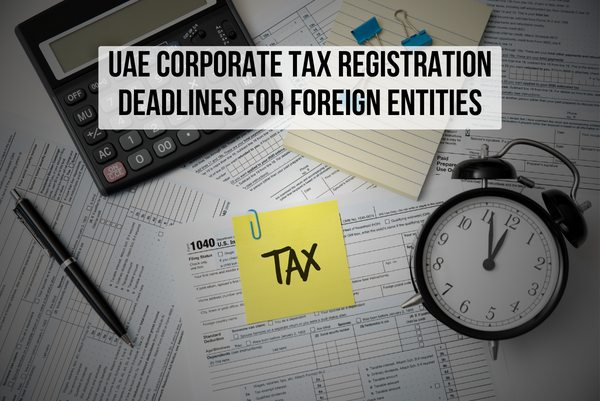Taxation is a very crucial part of business companies. With this blog, we shall give you valuable insights into UAE Corporate Tax Calculation.
Before that, let us give you a sneak into what exactly is corporate tax.
What is UAE Corporate Tax Calculation. (CTC)?
UAE Corporate Tax Calculation refers to the process of determining the amount of tax payable by corporations operating in the United Arab Emirates (UAE).
UAE Corporate Tax Calculation.
Calculating corporate tax can be a difficult task at times. Here is the formula to calculate corporate tax.
| Taxable Income = Adjusted gross income – All applicable deductions |
UAE Corporate tax
On December 9, 2022, FTA (Federal Tax Authority) issued Federal Decree-Law No. 47 of 2022. According to this law, businesses will become subject to UAE Corporate tax from the beginning of the first financial year that starts on and after 1st June 2023.
Calculation of Taxable Income
The CT regime states that the use of the accounting net profit (or loss) as stated in the financial statements of a business forms the base and foundation for determining the taxable income.
In the UAE, the financial statement is prepared by following the International Financial Reporting Standard (IFRS). The financial statement is very important for calculating taxable income. The final and necessary adjustments can be made appropriately to arrive at the correct taxable income. For corporate tax in UAE, the calculation is mainly done on business annual taxable income.
For corporate tax in the UAE, the calculation is as follows:
- For taxable income of AED 375,000 or less, the corporate tax rate is 0%
- For taxable income exceeding AEd 375,000, the UAE corporate tax rate is 9%
Corporate tax is calculated at 9% of the net profit shown in the company’s financial statements prepared by following IFRS after deducting all applicable deductions and excluding the exempted income.
Let us look into the deductible expenditures
- Restrictions on some Deductible Expenditures:
Entertainment expenditures – 50% allowed
This includes the entertainment of customers, shareholders, suppliers, and other business partners such as meals, transportation, accommodations, admission fees, and other expenses.
Interest Expenditure- 30% EBITDA allowed
Net Interest Expenditure (NIE) allowed up to 30% of EBITDA
The general interest limitation was set and no interest deduction would be allowed if the loan was obtained directly or indirectly from the related party for the following-
- Dividends/profit distributions
- Redemption, repurchase, reduction, or return of share capital
- Capital contribution
- Acquisition of ownership interest in a legal entity that is or becomes a related party following acquisition
- 100% Non-Deductible Expenditure
This includes
- Exempt income
- Capital in nature
- Dividend/profit distributed
- Fine and penalties other than compensation for damages for breach of contract
- Bribes and other illicit payments
- Recoverable input VAT
- Non-business expenses or personal expense
- Donations paid except to Qualified Public Benefit Entity
- Other expenses as may be mentioned by the cabinet minister
- Taxes imposed outside the UAE
- Tax Losses Relief
Businesses can offset tax losses against the taxable income of subsequent tax periods when computing the taxable income for a particular period. Any tax loss remainder can be carried forward to a subsequent tax period.
- Unrealized Gains or Losses
Unrealized gains or losses crop up when an asset or liability held by a business has changed in value with no transaction to generate a gain or loss. For instance- When a business property increases in value, but the property is not sold, the gain would be unrealized.
- Exempt Income
Exempt incomes are those incomes that are not chargeable as per Corporate Tax Law. UAE resident companies will be subject to corporate tax on the entire income, including capital gains.
Corporate tax planning
Tax management and planning are tricky and risky for most corporations. This implies specifically for those who have huge money at stake under the taxation process.
Here is a comprehensive step-by-step guide for corporate tax planning.
- It is important to strategize corporate financial affairs to maximize profit taking into account the benefits of deductions and exemptions
- Plan your finances right so that the payable tax amount is reduced and the gains are maximized.
- It is essential to follow the rules, regulations, and SOPs that are laid by the government.
- Awareness and recent updates about tax laws with rules and regulations are a must for good and healthy tax planning.
- It is important to involve the best professional financial expert to lead the taxation process.
Conclusion
Corporate tax planning is a must for every corporate entity whether business or professional. Tax management is very important for business planning. It is important to be on the right page and in line with the legal and financial rules set by the government. Along with this, it is important to practice ethical steps and have extensive knowledge about taxation. To get in-depth information on corporate tax, get connected to one of our experts at Auditac International Consultancy right away!












